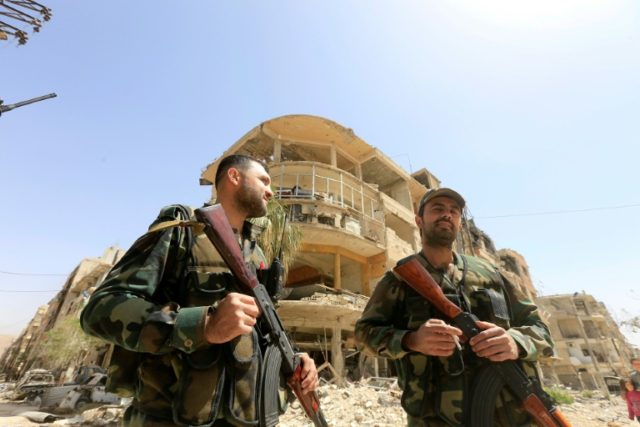Iranian Vice President Eshaq Jahangiri visited Syria with a delegation of businessmen on Monday and Tuesday to discuss reconstruction deals with the Assad regime as Syria’s bloody eight-year civil war winds down.
The Jerusalem Post on Monday quoted Syria’s parliament welcoming Iran as a “partner in victory” and urging it to become a “partner in rebuilding” as well.
“Senior Syrian officials said earlier that Tehran and Damascus would sign various agreements, most notably regarding mutual defense and business. Iran is building large projects with local companies in Syria, in return for its participation in the war on the side of President Bashar Assad,” the JPost reported.
In addition to attending a session of the Joint High Council for reconstruction, the Iranian delegation met with both Syrian Prime Minister Imad Khamis and President Bashar Assad.
Syria’s state-run SANA news service described Assad and his Iranian guests bonding over their mutual distaste for the Western world and its allies in the Syrian resistance:
President al-Assad stressed that these agreements and projects of cooperation are of strategic dimension and constitute a solid economic basis that would contribute to enhancing the steadfastness of Syria and Iran in the face of the economic war waged on them by some Western countries.
President al-Assad affirmed the importance of intensifying joint efforts at this stage to thwart efforts of those countries that continuously work to weaken the two countries, control their independent decision and to break the will of their peoples after the failure of those countries to achieve that through backing terrorism.
For his part, Jahangiri pointed out that the visit of the Iranian delegation and holding meetings of the Joint Committee at this time carries a message to the Syrian people and the international community that, Iran, which has stood by Syria in its war against terrorism, will also be in the reconstruction phase.
He said that Syria was the front line in the war on terrorism and that the successes achieved in this area have contributed to preventing terrorism from spreading in other countries, despite the refusal of some Western countries to recognize that so far.
The Syrian-Iranian meetings were suffused with countless references to the Syrian opposition as “terrorists” supported by the West and defeated with the assistance of Iran. Iranian Vice President Jahangiri spiced up a meeting with one of Syria’s deputy prime ministers by throwing in a plea for “coordination on all levels to face the Zionist and Imperialist threats,” as SANA put it.
The Iranian visit resulted in what Jahangiri described as “very important agreements on banking cooperation,” plus an Iranian commitment to help Syria rebuild its power grid and cooperative agreements on industrial development, trade, and agriculture. Memorandums of understanding were reportedly signed between Syria and Iran on education, housing, railroads, and investment.
The Tehran Times said on Tuesday that some of the financial agreements between Syria and Iran were intended to combat “money laundering and terrorism financing.”
Those agreements may also create a financial network that can relieve the pressure of Western sanctions on both Damascus and Tehran. Some Iranian businessmen have cited sanctions as one of the major obstacles to working out big contracts for Syrian reconstruction. A great deal of money is on the table, as the Assad regime has estimated between $250 billion and $400 billion.
Philip Smyth of the Washington Institute for Near East Policy told the Jerusalem Post on Tuesday that Iran’s new position in Syria gives them so much access to the Israeli border that it’s a “dream come true” for the terror masters of Tehran.
Smyth saw agreements between lran and Syria today as laying the groundwork for a greater menace to Israeli security in the years ahead.
“The Iranians are looking at this as a decades-long process, the war in Syria gave them a new opportunity,” he said. “They are on the ground, they have force-presence there and they are building local, domestic Hezbollah segments. Over the long-term, even if they are not ideologically loyal to them, they are still taking a check from Tehran.”

COMMENTS
Please let us know if you're having issues with commenting.